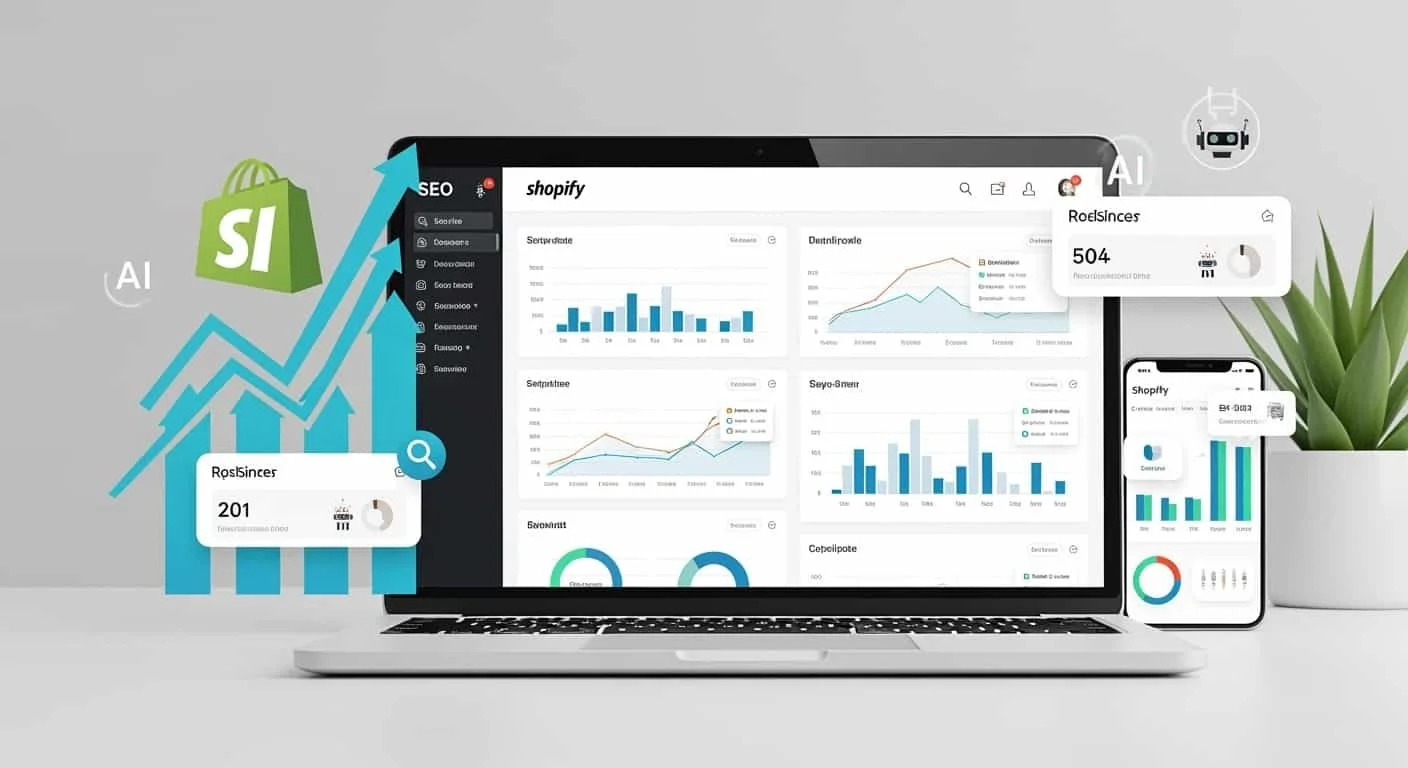Conducting an AI audit: a complete guide for better marketing results
Do you know where 40% of your marketing budget is going? A wellness company from Ghent discovered through a thorough AI audit that their Meta ads were reaching people who would never buy. After systematic optimization, their conversion rate increased by 27% in 6 weeks.
- 3-pillar analysis: Content & SEO optimization, marketing performance evaluation, and AI automation implementation for a complete marketing audit
- 6-step process: Data collection, content analysis, advertising evaluation, automation review, AI tool scan, and actionable roadmap within 2-3 weeks
- Proven results: 34% ROAS improvement in e-commerce, 41% lower lead costs in B2B, 25-45% marketing ROI increase within 3 months
- Quick wins today: Budget reallocation (30 min), conversion tracking fixes (1 hour), SEO optimization (2 hours) for immediate impact
- Accessible tools: Start with a €200-400/month toolstack, combine free tools (Google Analytics, ChatGPT) with paid solutions
- Strategic advantage: Discover 5-7 optimization opportunities, avoid data overload, build a competitive edge with AI-driven marketing
A professional AI audit of your digital marketing often yields surprising insights that generate immediate revenue. You'll not only discover where your advertising budget is leaking, but also receive a concrete roadmap with AI marketing tools that improve your ROAS and conversion rates.
In this practical guide, you'll learn step by step how to perform an effective AI audit, which marketing analysis tools you need, and how to convert the findings into measurable revenue growth. Whether you are an SME or a scale-up, this method works for any budget.
What is an AI audit? (Featured snippet optimization)
An AI audit is a systematic analysis of your digital marketing that uses AI tools and data analysis to discover hidden opportunities and inefficiencies. The process examines three core areas:
Content and visibility: SEO performance, AI search engine optimization, and engagement analysis
Marketing performance: ROAS evaluation, audience targeting, and conversion funnel optimization
Automation potential: Workflow improvement, AI tool implementation, and personalization opportunities
Goal: Identify where your marketing return is falling short and which AI solutions will directly impact your results.
Duration: 2-3 weeks for a full audit (DIY) or 5 working days (professional) Average ROI: 25-45% improvement in marketing performance within 3 months
What exactly is an AI-audit?
An AI audit combines data analysis with artificial intelligence to thoroughly examine your entire marketing strategy. Unlike traditional audits that focus on what's wrong, an AI audit shows what becomes possible.
The three pillars of an effective AI audit
1. Content and visibility analysis AI tools scan your content marketing for:
SEO performance and keyword gap analysis
Optimization for AI search engines (ChatGPT, Perplexity, Claude)
Content formats that generate more user engagement
Voice search and featured snippet opportunities
Search intent mapping and content clusters
2. Marketing performance evaluation Advanced algorithms analyze your digital marketing:
Actual ROAS per advertising channel and campaign performance
Audience overlap and advertising budget waste
Conversion funnel optimizations and drop-off analysis
Customer journey mapping and touchpoint effectiveness
Attribution modeling and cross-device tracking
3. Automation and AI implementation The marketing audit identifies:
Repetitive marketing tasks that AI can automate
Workflow optimizations that save time and costs
AI marketing tools specific to your business sector
Personalization options for better customer experience
A professional AI audit typically reveals 5-7 concrete optimization opportunities that companies themselves overlook.
“AI will fundamentally change the way we do marketing, and companies that don't invest in AI-driven analysis now will fall further and further behind.”
Source: CNBC - Microsoft CEO: more people should use AI
AI audit step-by-step plan: 6 steps to better marketing ROI
Step 1: Marketing data collection and preparation (day 1-2)
Start by systematically collecting access to your most important digital marketing platforms:
Essential data sources for your marketing audit:
Google Analytics 4 and Search Console (website performance data)
Advertising accounts (Google Ads, Meta Business Manager, LinkedIn Ads)
Email marketing platform (Mailchimp, Klaviyo, HubSpot)
CRM system and sales funnel data
Social media analytics and engagement metrics
Website heatmaps and user session recordings (Hotjar, FullStory)
Pro tip: Take screenshots of your current marketing KPIs for accurate before/after comparison.
“Most marketers underestimate how many insights are hidden in their own data. AI tools can identify patterns that people simply miss due to the scale and complexity of modern marketing data.”
Source: MIT Sloan - Data-centric artificial intelligence
Step 2: Content performance analysis (days 3-5)
Use AI tools to systematically evaluate your content:
AI tools for content audit:
ChatGPT/Claude: Content gap analysis and keyword research
Surfer SEO: On-page optimization and competitor comparison
Clearscope: Content scoring and semantic optimization
AnswerThePublic: Long-tail keyword opportunities
Concrete actions:
Analyze your top 20 landing pages for conversion performance
Identify content pieces with high traffic but low conversion
Check your content for GEO-optimization for AI search engines
Evaluate your content mix: blogs, videos, infographics, podcasts
Implement structured data for better AI interpretation
Step 3: Evaluate advertising effectiveness (days 6-8)
Deep dive into your advertising performance with AI-driven analysis:
Google Ads audit checklist:
Keywords with high costs, low conversion
Ad copy A/B test results and emotional triggers
Landing page relevance and Quality Score
Negative keywords and budget waste
Meta Ads analysis:
Audience overlap between campaigns
Creative fatigue and refresh schedule
Attribution model impact on ROAS
Platform comparison and budget allocation
Step 4: Marketing automation review (day 9-11)
Investigate which processes can be automated:
Email marketing audit:
Open rates and click-through rates per segment
Abandoned cart recovery flows
Welcome series optimization
Segmentation effectiveness
Lead nurturing flows:
Sales funnel drop-off points
Lead scoring and qualification
CRM integration and data sync
Follow-up timing optimization
Step 5: AI tool implementation scan (day 12-14)
Identify specific AI tools that make an impact for your business:
For e-commerce:
Shopify AI apps for personalization
Dynamic pricing and inventory management
Customer service chatbots
Product recommendation engines
For B2B services:
LinkedIn automation tools
Proposal generation with AI
Meeting scheduling optimization
Step 6: Reporting and prioritization (day 15-16)
Compile your findings into an actionable roadmap:
Reporting structure:
Executive summary with top 5 quick wins
Budget reallocation recommendations
30-60-90 day implementation timeline
ROI projections per recommendation
Required tools and investments
Essential AI audit tools and cost overview (2025)
Free marketing audit tools for beginners:
Google Analytics Intelligence: AI-powered insights into your website data
Google Optimize: A/B testing for conversion rate optimization
Meta Business Suite: Audience insights and advertising performance data
ChatGPT Free: Content gap analysis and keyword research support
Google Search Console: Organic search performance and indexing issues
Paid AI tools for in-depth marketing analysis:
Semrush Pro: €120/month - Complete SEO audit and competitor analysis
HubSpot Marketing Hub: €45/month - Marketing automation and lead tracking
Hotjar Business: €39/month - User behavior analysis and conversion optimization
Klaviyo: €20/month - Email marketing performance and customer segmentation
Surfer SEO: €59/month - Content optimization and SERP analysis
Budget planning: You can largely perform a professional AI audit with a tool stack budget of €200-€400 per month. For SMEs with a limited budget: start with free tools and upgrade to paid versions when you see initial results.
“AI democratizes advanced marketing analytics. What was previously only accessible to large companies with million-dollar budgets can now also be implemented by smaller businesses with the right tools and strategy.”
Source: Fortune - Marc Benioff on AI transformation at Salesforce
Concrete case studies and results
Case 1: E-commerce fashion retailer
Situation: Online clothing store with declining conversion rates AI audit findings:
45% of Google Ads budget was spent on irrelevant search terms
Product pages lacked structured data for rich snippets
Email flows stopped after the first transaction
Results after 8 weeks:
34% improvement in advertising ROAS
67% more organic traffic via featured snippets
156% increase in customer lifetime value
Case 2: B2B software company
Situation: SaaS startup with high lead acquisition costs AI audit discoveries:
LinkedIn ads had 23% audience overlap
Website lacked conversion tracking for trial signups
Content hub lacked topic clusters for SEO
Results after 12 weeks:
41% reduction in cost per qualified lead
127% more demo bookings via optimized funnels
89% improvement in organic search ranking
These results are similar to our customer cases. Companies that systematically implement AI audits see an average of 25-45% improvement in marketing ROI within 3 months.
“The companies that are now investing in AI-driven marketing optimization are not only seeing better results, but are also building a sustainable competitive advantage. It's no longer about whether you're going to use AI, but how quickly you implement it.”
Source: CNBC - IBM CEO Ginni Rometty on AI and the future of work
Quick wins you can implement today (immediate ROI)
1. Advertising budget reallocation (30-minute impact)
Pause underperforming campaigns with a ROAS below 200%
Increase budget for top-performing ads by 20-30%
Implement dayparting for optimal timing optimization
Review and refine audience targeting parameters
2. Conversion tracking fixes for better data (1-hour setup)
Install Google Analytics 4 enhanced e-commerce tracking
Set up Facebook Conversions API for iOS 14+ tracking
Add UTM parameters to all external marketing links
Implement mobile tracking optimizations for mobile commerce
3. Content SEO optimization starter pack (2-hour implementation)
Add FAQ sections to your most important product/service pages
Optimize meta descriptions for featured snippets in search results
Implement schema markup for local businesses and reviews
Start with local SEO optimizations for geographic targeting
4. Email marketing automation quick fixes (45-minute setup)
Set up abandoned cart recovery sequence with a 3-email automation flow
Segment new vs. returning customers for personalized messaging
A/B test subject lines with emotional triggers and urgency
Implement post-purchase email sequences for customer retention
Common mistakes in AI audits (and how to avoid them)
1. Marketing data overload without concrete action plans
Problem: Many companies collect mountains of marketing data but take no concrete actions. Solution: Focus on a maximum of 5 high-impact priorities at a time. Implement first, optimize later.
2. Implementing AI tools without a clear marketing strategy
Problem: Buying tools without knowing which business problem you're solving. Solution: Always start with your business objectives and customer pain points. AI tools are means, not ends.
3. Perfection over progression in marketing optimization
Problem: Endless analysis without starting implementation. Solution: Start with 80/20 implementations and quick wins. You can always optimize further once you measure initial results.
4. Missing baseline measurements for ROI tracking
Problem: Without pre-measurements, you cannot prove marketing ROI or performance improvement. Solution: Document all current marketing KPIs before you start: ROAS, conversion rates, cost per acquisition, customer lifetime value.
5. Ignoring mobile-first marketing trends
Problem: Desktop-focused audit while 70% of traffic is mobile. Solution: Prioritize mobile optimization and mobile user experience in your audit process.
Next steps: from audit to growth
An AI audit is the starting point, not the endpoint. For sustainable growth, you need an integrated marketing approach:
Month 1-2: Foundation
Implement technical quick wins
Set up proper tracking and attribution
Start with basic marketing automation
Month 3-4: Optimization
A/B test all important customer touchpoints
Refine audience targeting and segmentation
Implement personalization workflows
Month 5-6: Scaling
Automate repetitive optimizations
Expand to new channels and target groups
Implement predictive analytics for growth
For Shopify e-commerce companies, an AI audit often makes the difference between stagnation and explosive growth. The platform offers so many AI integrations that most entrepreneurs only utilize 20% of the possibilities.
View our Shopify cases to see how other companies optimized their webshop after a thorough audit.
The ROI of a professional AI audit
Let's be honest: a thorough AI audit takes time and sometimes budget. But the return on investment speaks for itself:
Average investments:
DIY AI audit: 40-60 hours + €400 tools = €2,400 of your own time
Professional audit: €2,500-€5,500 for complete analysis
Enterprise audit: €7,500+ for complex multi-channel setups
Typical returns within 6 months:
25-40% improvement in advertising ROAS
15-30% reduction in customer acquisition costs
35-60% increase in conversion rates for key funnels
40-80% time savings through automation
An investment of €3,000 in a professional AI audit yields an average of €18,000-€45,000 in additional revenue in the first year.
“The biggest risk for companies is not making the wrong AI investments, but not making any investments at all. The cost of doing nothing is much higher than the cost of experimenting and learning.”
Source: Axios - Nvidia CEO Jensen Huang on AI and the future of work
Professional AI audit versus DIY approach
When do you opt for a DIY audit?
You have 50+ hours available for thorough analysis
Your team has experience with data analysis and AI tools
Your budget is limited to €500 for tools
Your business has fewer than 5 marketing channels
When do you invest in professional help?
Your revenue depends on complex multi-channel marketing
You don't have time for 40+ hours of analysis work
You want external expertise and an independent perspective
Your budget for growth investments is €5,000+
For most SMEs, a hybrid approach is optimal: professional audit for strategic direction, in-house team for implementation.
Companies considering outsourcing often benefit from a combination of AI audit and performance marketing guidance.
Ready to take your marketing performance to the next level?
A systematic AI audit of your digital marketing is no longer a luxury; it's a business necessity to remain competitive in 2025. Whether you opt for a DIY approach with marketing audit tools or professional AI audit guidance, the most important thing is to start with data-driven optimization today.
The companies that invest in AI-driven marketing analytics and automation now are building a competitive advantage that will become insurmountable for their competitors in 2 years.
Concrete next steps for better marketing ROI:
Download our free AI whitepaper with a complete audit checklist and 47 checkpoints
Schedule a strategic AI consultation to discuss your marketing optimization options
Start today with the quick wins from this article for immediate impact
Consider AI training for your marketing team
Do you want professional AI audit support? Discover our AI audit service or contact us for a free marketing strategy consultation. We have achieved similar results for Belgian SMEs in various business sectors.
The question is no longer whether AI will transform your marketing performance, but how quickly you implement that transformation for competitive advantage.

🚀 Get more results from AI, online marketing, and e-commerce
Do you have ideas you want to realize faster? Do you want more leads, smarter marketing, or better use of AI in your company? We actively think along with you. Discover what AI can do for your growth, online marketing or e-commerce can mean for you.
💬 Prefer to spar immediately? Schedule a no-obligation video call with Frederiek.
👉 Or ask your question via the contact form, email frederiek@clickforest.com or call +32 473 84 66 27.
📄 Would you like to get some inspiration? Download the free whitepaper 'AI for SMEs in 2025' with concrete tips & insights.
Together we will discover how you can get more out of your marketing, technology and AI today.
Frequently asked questions about AI audits
-
A thorough AI audit takes 2-3 weeks with a DIY approach. Week 1 for data collection, week 2 for analysis, and week 3 for strategy development and reporting. Professional audits usually deliver results within 5 business days.
-
You need access to Google Analytics (at least 3 months of data), advertising accounts, email marketing platform, and sales figures. Without this basic data, you cannot perform a reliable audit.
-
Absolutely. Smaller companies often have the most to gain because they still have many untapped opportunities. A marketing budget of €1,000/month already justifies a thorough audit.
-
For dynamic companies, a light audit every quarter, a full audit annually. E-commerce companies with seasonal peaks can benefit from semi-annual audits.
-
This almost never happens. Even well-performing companies find an average of 3-5 optimization opportunities. If an audit does not reveal any opportunities, the analysis was probably not thorough enough.
-
Yes, an AI audit often forms the basis for SEO optimization, performance marketing setup, or Shopify store optimization. The audit shows where you can best invest. Many companies combine this with CRO services for maximum impact.
-
For beginners: ChatGPT for strategic analysis, Google Analytics Intelligence for data insights. For advanced users: Semrush for SEO, HubSpot for automation analysis, Hotjar for user behavior. Check out our complete AI tools guide for more options.
-
Set up baseline KPIs for the audit: ROAS, conversion rates, cost per acquisition, lifetime value. Measure the same metrics after 30, 60, and 90 days of implementation. Expect a 15-25% improvement in the first month. Read more about performance marketing metrics.
-
Certainly. B2B companies particularly benefit from lead qualification optimization, sales funnel improvement, and LinkedIn marketing automation. Longer sales cycles make thorough analysis extra valuable. Check our B2B lead generation approach.
-
A good audit delivers concrete, prioritized action items with ROI projections. A bad audit only gives general recommendations without specific implementation steps. Always ask for examples of previous audits.
Sources and references
AI adoption and marketing trends
McKinsey Global Institute: "AI implementation in marketing: research into 2025 trends" - https://www.mckinsey.com/capabilities/mckinsey-digital/our-insights/ai-adoption-advances-but-foundational-barriers-remain
HubSpot Research: "State of Marketing Report 2025: AI adoption statistics" - https://blog.hubspot.com/marketing/state-of-marketing-2025
Salesforce Marketing Intelligence: "Connected Customer report: marketing automation ROI" - https://www.salesforce.com/resources/research-reports/connected-customer/
Marketing performance and ROI studies
Google Marketing Platform: "Performance advertising benchmarks and best practices 2025" - https://marketingplatform.google.com/about/resources/performance-advertising-benchmarks/
Meta Business Research: "Cross-platform advertising effectiveness study" - https://www.facebook.com/business/news/insights/cross-platform-advertising-effectiveness
Nielsen Marketing Analytics: "Marketing mix modeling trends and AI impact" - https://www.nielsen.com/insights/2024/marketing-mix-modeling-trends/
E-commerce and conversion optimization
Shopify Commerce Trends: "E-commerce marketing automation report 2025" - https://www.shopify.com/enterprise/ecommerce-marketing-automation
Klaviyo Research: "Email marketing performance benchmarks across industries" - https://www.klaviyo.com/marketing-resources/email-marketing-benchmarks
Hotjar User Research: "Conversion rate optimization through user behavior analysis" - https://www.hotjar.com/conversion-rate-optimization/research/











